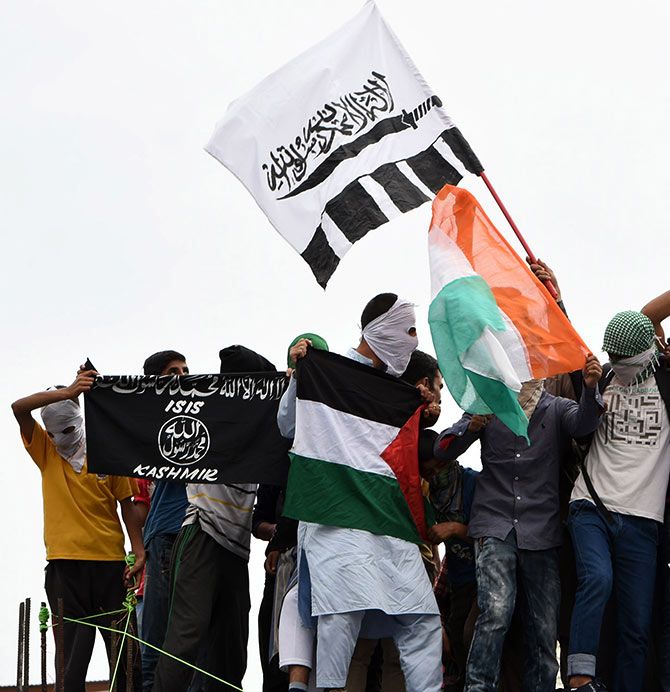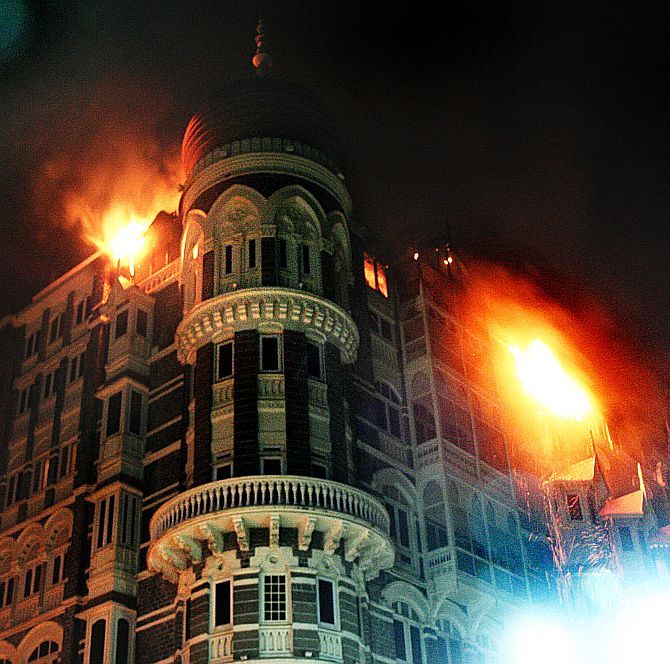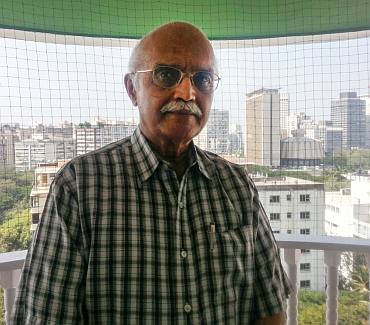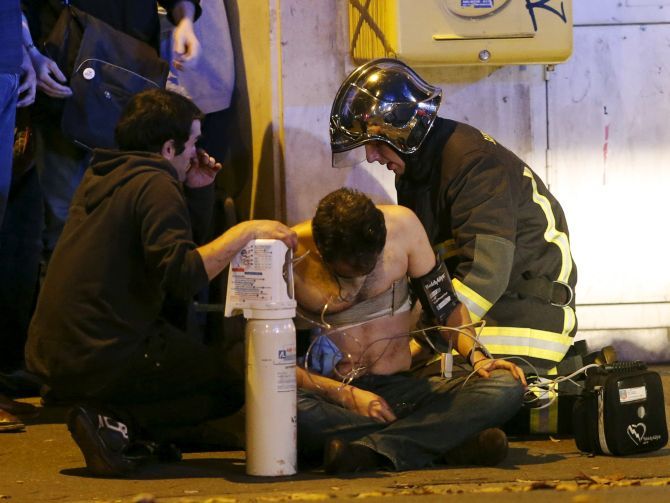'These terrorists want to smash Western civilisation, smash India. For the time being their main target would be the US and Europe.'
'You do not know if there is a lone wolf somewhere. Just imagine the harm it would have caused if such a lone wolf attack with just one AK-47 had happened at the Wembley stadium where Prime Minister Narendra Modi was addressing Indians the same night these ISIS terrorists were running amok in Paris.'

Vappala Balachandran, is a former Special Secretary, Cabinet Secretariat, Government of India, better known as the Research and Analysis Wing.
The Indian Police Service officer was a member of the Ram Pradhan Inquiry Commission appointed by the then Maharashtra government to look into the lapses of intelligence by the Mumbai police in the 26/11 attacks.
Balachandran, below, left, spoke to Prasanna D Zore/Rediff.com about what went wrong in Mumbai seven years ago, what could have gone wrong in Paris on Friday, November 13, where Daesh terrorists killed more than 130 people in Mumbai-like attacks and what needs to be done to contain the Daesh menace.
The Ram Pradhan Inquiry Commission, of which you were a part of, made several recommendations to the Maharashtra government to tackle such eventualities in the future. How many of those recommendations were accepted by the state government?
We made as many as 27 recommendations, most of which were about processing of intelligence. Because it is our observation that the uniformed police on the ground do not know how to process intelligence effectively.
When you get some intelligence inputs, the police should be capable of interpreting them to the local conditions.
Somebody sitting in Delhi is issuing a threat alert about a likely attack in Mumbai. Now, they (the intelligence sleuths in Delhi) may not have the full picture. No, intel report can be 100 per cent correct or precise. Nowhere has this happened.
The point is such intel inputs are left to the competence and imagination of the local uniformed people to interpret it with Mumbai in mind.
Could you cite an instance?
Let me tell you about a success story and failure story...
The people who got intelligence (in Delhi about the 26/11 attacks) only heard the words 'Leopold' a number of times. People sitting in Delhi had no clue about the Leopold. When they promptly passed it on to the Mumbai police they knew what Leopold was all about.
The then DCP (deputy commissioner of police) of Zone I (in south Mumbai) Vishwas Nangre-Patil (who is now the inspector general of police, Aurangabad) visited the place, warned them, removed hawkers from the vicinity; he did the right thing. He told people about the dos and don'ts.
This is one example of how an intel input which is not perfect or precise was interpreted as per the local condition by the men in uniform.
Similar intel inputs had come from Delhi (the Reseach and Analyis Wing) that the Lashkar-e-Taiyba was training a water-borne, sea-bound, squad for a terrorist attack. There were indications that it would be a sea-bound attack.
This is not merely the fault of the Mumbai police, but also of the Maharashtra government (the 26/11 attacks occurred despite intel inputs). They knew that the arms and ammunitions for the March 12, 1993 Mumbai bomb blasts had come from the sea.
After getting this information, the Maharashtra government's home department should have called a meeting of seniors of the Mumbai police, Indian Navy and Coast Guards officials and discussed coastal patrolling to thwart such attempts. But nothing was done.
So, this was an instance of failure in interpreting and acting upon received threats.
Should the central government not have taken cognisance of such threats apart from the state government and Mumbai police?
Yes, they should have thought about it. In fact, we did not pass any strictures against the central government in our report because our terms of reference did not extend to the central government.
We were not asked to comment on the (response of the) Government of India. I have written several newspaper columns blaming the central government (for this lapse).
What was the National Security Council doing?
What was the Union home ministry doing?
What was the defence ministry doing, knowing very well that the Coast Guard and Indian Navy were under them? They should have called a meeting to discuss this particular threat.
There were 16 intelligence reports that talked about 'sea-bound attacks' and 'fixed targets'. There were any number of clues to indicate that the Taj would be attacked, the Trident would be attacked; one intelligence (input) was about the railway station (the Chhatrapati Shivaji Terminus); there was no intelligence about Nariman (Chabad) House. There was no advance intelligence about it.

What inputs suggested that there were fixed targets like the Taj and Trident?
In their conversation the LeT masterminds spoke about the Taj and Trident. The station was mentioned. And the input about Leopold had come earlier, separately, upon which prompt action was taken.
In fact, the Mumbai police did the correct thing. The Mumbai police under Nangre-Patil went there and warned them, but there is this thing everywhere in the world called as psychological hang-up that if in the past something happened (the Mumbai bomb blasts of March 12, 1993 and the subsequent serial train blasts of July 13, 2006) the same thing (planting of bombs) would happen again.
They (the police) went there and warned them (the hotels and the security at the CST) to keep a watch on unidentified objects. They briefed these people about bomb threats, not knowing (paying attention to) that the intel inputs said there would be fidayeen attacks. They used the word fidayeen.
In all fairness to the Mumbai police, I must say that Nangre-Patil did warn the Taj to desist from having multiple entrance points. You see, there was a side entrance from the North Court side. Then there is this main entrance. They said the North Court should be closed. The Taj did not do that.
One group of terrorists came from the front, the other group after killing people at the Leopold came from the North Court.
Within the available means, the Mumbai police did try to respond to threats, but the most important lapse was the Maharashtra government's and central government's in not protecting the sea coast.
What recommendations did the Ram Pradhan Inquiry Commission suggest in order to prevent such lapses in the future?
One was whenever such intel inputs are received the concerned people should be called and the threat input discussed thoroughly. It is not that the lower staff (the police force in the field) don't have any suggestions or ideas.
Quite contrarily, my experience is that the lower people are much more aware about the ground situation and can feed you with solid suggestions too.
Remember that intelligence has various stages. After getting intelligence you have to do 'intelligence arbitration', which is about finding out various possibilities. Like, with so and so input, what is possible in Mumbai? So you discuss it with the Colaba police, the Borivali police, etc. You get a wider perspective that way.
But if you are not doing that and that was not being done (sharing intel inputs with the police in the field), maybe because of rush of work, they (senior Mumbai officers) would send only text messages to the people in the field.
So, the man sitting in Colaba or other police stations will interpret it according to his capability. So, we told them (the Maharashtra government) that senior officers should meet them personally (and discuss grave threat inputs) and it is being done now.
The other recommendation was about quick response teams.
From the time the state police started receiving terror threats since the 1990s they formed special squads that would go out in mufti, had good weapons training, etc.
Over a period of time, these special squads were not used at all. They were just attached to the Crime Branch (the Mumbai police's elite team of detectives) and incorporated for encounters.
Later, when the diplomatic missions (the US and British consulates) came they formed special squads. But they were limited only to guard static posts. They had no instruction that in case of a terrorist attack they should run and counter attack. Because basically when a policeman is posted at a place, he cannot leave it as per rules. It is not their fault.
Then they formed the QRT or the quick response team. In a QRT, all commandos work in a team. No commando works like James Bond. The QRT comprises of one communication chap, one paramedic -- they are capable of fighting too as they are trained like commandos -- and the other three people would be actual fighters with one being the leader of the squad and the other two snipers.
If they do not move in a group, they will be like birds without wings. So, the QRT people were sent to the Taj and Trident. But when we questioned many of them, they said, 'Aamhala koni kay karaycha te sangitla nahi (nobody gave us instructions about what to do when there is a terror attack).'
You have to give them specific orders.
The other mistake the (then) Maharashtra government did was to split them into groups as personal bodyguards. For instance, one QRT commando will be assigned to be a bodyguard of a given senior officer.
QRT commandos are not trained to be bodyguards.
So, at the time of the attacks the QRT commandos were not acting as a team?
Yes, they were all scattered. Some of them were in Taj, some were in the Trident.
Did they act?
They were not told to act at all. People who actually acted were Nangre-Patil and the cops he took along with him at the Taj. A few were injured, one fellow died too.
The QRT people did try to act, but I don't think they were of any consequence. Actually, they are effective only when they act as a team.
The worst part was this QRT commandos who were at these hotels did not have anti-grenade protection.
In a terror attack when you try to approach or attack a terrorist, he throws a grenade at you. This is what they call 'area clearing weapon'. The QRT commandos had no anti-grenade weapons. Only when the National Security Guards came they had anti-grenade protection. They too lobbed grenades at the terrorists.
The QRT commandos were not equipped properly. That is true and that they admitted in front of the Ram Pradhan Commission too. But given their limited resources, the Mumbai police reached the various spots within five minutes for which we complimented them.
A restaurant manager from the Trident told me that the police came only with lathis to face AK-47 wielding terrorists. There was no cowardice. Not a single constable ran away.
In other countries, they (policemen when faced with such daunting threats) run away. The lathi-wielding cops knew it was a terrorist attack, but none of them ran away.
We also pointed out the lethargic policy of weapons procurement.
Because of lack of adequate weaponry the Mumbai police could not practice weapons firing. Every ordinary constable is supposed to fire at least four rounds in a year. QRT commandos need much more firing training. But because of the shortage of ammunition that was not done.
We told them (the state government) you have too much bureaucracy in procuring weapons. For instance, even after all the clearances from the topmost cops you had to get the signature of the deputy chief minister. We criticised such bureaucratic delays.

Did the Maharashtra government accept/implement the recommendations of the Ram Pradhan Inquiry Commission report?
They have not reported to us what action was taken on our recommendations and whatever information we are getting is through the media and police. We acknowledge that the state government is expected to report to us. We are not supposed to report to them because we are a committee appointed by them.
The most important thing was psychologically, the people of the city as well as cops were not expecting such fidayeen attacks. They had never seen an attack like that.
But now they are psychologically prepared. That is the biggest defence against any surprise attacks.
There are problems. We have clearly recommended that the police force should not be overloaded. Since the ambulances could not come in time (during the 26/11 terror attacks), the police had to use their vans to transfer victims to hospitals.
In any country, that is not the job of the police. They are meant to carry combat troops in such situations.
We recommended that the municipal people should work hand-in-hand with the police, paramedics, etc. In GT Hospital, doctors ran away fearing rumours of attacks and so the police had to go and fetch them back.
How far these have been acted upon, we do not know. Civic services, hospital services and police services should go hand-in-hand.
After 26/11 and now the Paris terror attacks that share the same template, is the Mumbai police better prepared to handle a terror attack of such a magnitude again?
Definitely. I am still worried about coastal security though. While the Coast Guard is more alert now, what happens is that an area up to 12 nautical miles is the responsibility of the local police and they are still not in a position to guard this area.
The marine police stations set up along the Mumbai coast by their very nature are not capable of vigilance and surveillance for various reasons.
One, the psychology of policeman on land is different from that of a cop in the sea. A person who comes from a dry region, say Marathwada, gets panicky when he sees such huge expanse of water. He may not even know swimming. And then you feel insecure. So, somehow, he is doing his work (as marine police). And after three years he gets transferred to some dry area again.
But that is not the case with the marine police in New York. There, they will work only on sea. They are like the Navy or Coast Guard people wearing police uniform.
Unless we do that, the entire idea of having a string of marine police stations along our coasts will never succeed. You must have a permanent cadre of people who should not be transferred, but only do marine policing.
That is the problem with India's coastal security. Nowadays, the sea is used by the Bangladeshis, Sri Lankans, Pakistanis and they all look the same from a distance.
But there is better awareness today about these issues in the government at every level. Policing of 12 nautical miles from the mainland is a huge problem.
Why was the Maharashtra government not too keen to table the Ram Pradhan Inquiry Commission report in the state assembly?
The reason we were given informally was some of the remarks would have been politically embarrassing for them. Officially, they said the report was sensitive. But we did not consider it as sensitive.
Our report consisted of three documents.
One was a 100-page report which was eventually placed on the table of the Maharashtra assembly, but whether it was a public document or not, we do not know. Some of my friends said even when such reports are tabled on the floor of the House they do not become public documents. Some others differed from this opinion. Some say it is only for members of the legislature.
The second document was our analyses of the intelligence reports received by the state police and what actions were taken by them.
The third document related to training of commandos, which I drafted after consulting some very good experts from the Indian Army and security establishment who retired from their service and who I knew because of my background, after we realised that the QRT commandos were not adequately trained.
The last two we marked as secret and the first report, which was a general report, was not marked secret.
Now, they (the government of Maharashtra classified our report) and tabled only the Action Taken Report. We were informally told that the then cabinet found some of the remarks in that report embarrassing.
For example, we had made some remarks about the top people in the home department and at the political level too.

Can we say that the French police was not vigilant enough and that allowed so many terrorists to sneak in from across Belgium and carry out such attacks?
Even in the Paris attacks, from where did the attackers get so many automatic weapons? I will tell you the reason.
After the Charlie Hebdo attack they should have conducted nation-wide searches of all arms which were not done. France is not as liberal as American states when it comes to issuing a gun license.
Also, while there is no comparison, on November 3, 2015, the Maharashtra police has done a very good de-radicalisation programme that sensitised the police what exactly de-radicalisation is. People from Singapore were invited for this programme. I too gave a lecture.
I told them that Britain's MI5 chief Andrew Parker had warned that there could be an imminent ISIS attack on the British. He said he did not see such radicalisation of young minds in the 36 years of his service with MI5. He said this in a briefing on October 28. I am wondering why that warning did not cross over to France. Now, this terror attack, as per Parker's fears, happened in Paris instead of London.
He must have been privy to electronic surveillance. As we all know now, CNN had cited Iraqi intelligence officials having warned of such terror attacks. That was not conveyed to the police in Paris.
The first precaution for containing any terror attacks is entry control. The Paris police did no entry control in the stadium or the concert hall where the maximum number of people were killed. Anybody with bags and haversacks were allowed.
At the Taj, we asked the security people why they didn't check people's backpacks when they entered the hotel and they said, 'We thought these were backpackers. We have a number of such guests entering the hotel.'
These small lapses lead to serious situations as we saw in Paris.
Considering the spread of Daesh (ISIS) ideology, is there a possibility of Paris-like attacks happening in Mumbai or for that matter any other city in the world?
The problem even in France was as long as they were going to Syria and taking part in the civil war on the side of ISIS (Daesh), they were not considered a threat to France.
But when they go there they are fully brainwashed and radicalised and when they come back they start spreading the venom. The fighters returning are more of a threat.
I have been writing about this since January 2014. I have been the first to warn the world about the dangers of ISIS (Daesh) when it was in its infancy. Even the Western observers did not know that ISIS (Daesh) is a different, more brutal and virulent animal. They always likened them to Al Qaeda. Then suddenly you find this Caliphate thing coming.
When these radicalised people start coming home they start doing it (terror attacks). That danger is very much there.
Whether they will get enough arms and ammunitions to carry Paris-like attacks is a different thing. We still do not know the number of illegal arms which are floating around the world and even in India.
Take the arms in possession of the North-East rebels (in India). Nobody knows the number of unrecorded arms floating around in India.
I think returning radicalised people can pose a threat to India.
We should not discount any ISIS (Daesh) threat in India. Thankfully, the Union home minister has said so in as many words and acknowledged it because they can be very deadly and brutal.
These ISIS (Daesh) terrorists want to smash Western civilisation, smash India. For the time being though, their main target would be the US and Europe.
You do not know if there is a lone wolf somewhere. Just imagine the harm it would have caused if such a lone wolf attack with just one AK-47 had happened at the Wembley stadium where Prime Minister Narendra Modi was addressing Indians there the same night these ISIS terrorists were running amok in Paris.
Thankfully, the British police monitored entry control and did not allow people with haversacks to enter the stadium.











 © 2025
© 2025